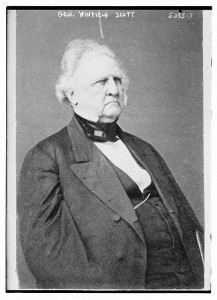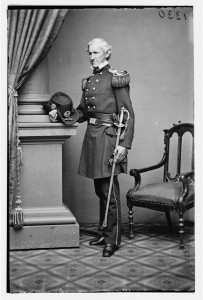150 years ago today, while a severe Nor’easter ravaged the eastern seaboard, retired General Winfield Scott traveled by train from Washington to New York City. Despite the stormy weather Scott arrived at his son’s home safely that night.
From The New-York Times November 4, 1861:
ARRIVAL OF GEN. SCOTT IN THIS CITY.
The General arrived in this City on Saturday evening, accompanied by the gentlemen of his Staff, and also by Secretary CAMERON, Maj.-Gen. BUTLER, Brig.-Gen. MCCALL, Col. CULLOM and others. On account of the severity of the storm, it was supposed that the party would remain over in Harrisburgh. This circumstance, together with the heavy rain, prevented the assemblage of the people who, under other circumstances, would have turned out to do honor to the retiring General. To those who were present to welcome him Gen. SCOTT gave a cordial grasp of the hand and a hearty benediction, expressing a wish, however, that no attempt at a reception should be made. When the crowd about the car cheered him, he said, good naturedly, “Oh, go home, friend, and don’t make a noise.” He was assisted to his carriage and was driven to his son’s residence in Twelfth-street. Adjutant-Gen. THOMAS escorted him to his home.
And it was quite a storm. Here’s an example from the same issue of The Times:
The Storm in Brooklyn.
The storm that passed over this city on Saturday evening was one of the most violent experienced here for many years. The rain fell in torrents, and almost without cessation, until midnight, and the wind blowed in fearful gusts, doing considerable damage, particularly to moveable fixtures. As usual on such occasions, signboards, awnings, chimney-tops, and ornamental frees were the first to yield to the blast, and were scattered in admirable confusion in every direction, so that pedestrianism was an unsafe experiment during the height of the gale. A new three-story brick house (unoccupied) on Elliot-place, between De Kalb and Lafayette avenues owned by JOHN BROPHY, was blown down, and a large number of buildings were more or less injured in different parts of the city. The sewers were all flooded, and some gave way under the action of the water. On Fulton-avenue, near Lafayette, the pavement sank into the sewer a distance of twenty or thirty feet. The high tide flooded many of the cellars on the low grades near the East River, and considerable damage must have resulted therefrom. The shipping at the wharves and the ferry-boats rode out the gale in safety.
Adjutant General Lorenzo Thomas served as General Scott’s chief of staff from 1853-1861, so it seems kind of fitting that Thomas accompanied “Old Fuss and Feathers” to the old warrior’s destination.



Pingback: Port Royal | Blue Gray Review